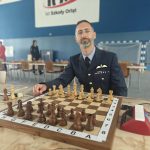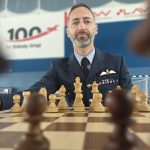Guest Article: NATO Chess Championship 2025: Excitement and Strategy in Dęblin
This August, Dęblin, Poland, became the center of NATO’s chess world as 115
military players gathered for the 35th edition of the annual championship.
Participants checked in a day early to get settled at the Polish Air Force
University’s hotel complex before the games kicked off.
The opening ceremony offered some unexpected moments. Brig. Gen. Pil. Dr.
Krzysztof Cur was introduced as “His Magnificence,” an honorific that sparked
smiles and conversations among the attendees. He also celebrated the university’s
100-year history, adding a historic flavor to the tournament.
Radosław Jedynak, president of the Polish Chess Federation, recognized Colonel
Sławomir Kędzierski for his contributions to military chess, presenting him with an
honorary gold distinction. Colonel Kędzierski reminded everyone that chess isn’t
just a game—it’s a mental workout and a symbol of NATO unity.
For Team UK, captain Ben Woolf highlighted what made this year’s
championship unique. “This was my first time visiting Poland and I always relish
the opportunity to see a new country and to experience some of the local culture.
The venue – within a Polish Air Force base – added more of a military element
compared to some previous venues. The visit to the Polish Air Force museum, as
well as the opportunity to view the drill show, was an experience appreciated by all
the competitors,” he said.
Competing on a military base also added a distinct atmosphere. Woolf, an Air
Force pilot himself, noted: “Listening to the jets and helicopters flying overhead
was fantastic and helped to underscore the reason we were all there – to foster and
improve relationships among the military organisations within NATO.”
As team captain, Woolf also spoke about balancing personal performance with
team support. “Whilst I take my own games very seriously, my priority is the
team’s results and making sure that my teammates have everything they need to
perform as well as possible. I encourage the team to meet each evening in order to
analyse the day’s games and help each other prepare for the following day.”
He also emphasized the broader value of chess within the NATO community.
“The game itself has many transferable skills to military life, and so encouraging
members of NATO military forces to take up the game can only be a good thing.
Over the 35 years that the Official NATO Chess Championships have been taking
place, many lifelong friendships have been formed. In the current era of
uncertainty it is more important than ever that bonds between NATO members are
as tight as possible.”
On the competitive side, Turkey, led by GM Batuhan Daştan, dominated the
tournament with 23 points, followed by Germany with 19.5 and Poland in third
place. The U.S. team also performed strongly, finishing just behind Poland on
tiebreaks with 18.5 points.
For younger service members interested in following in his footsteps, Woolf
offered some practical advice: “Play as many competitive games as possible. I
have always found playing and analysing to be the best way to improve at chess
and to reach the standard required to compete successfully at the NATO
championships.”
The Dęblin championship concluded with a memorable ceremony led by Brig.
Gen. Pil. Dr. Krzysztof Cur, who joined the Turkish grandmaster in cutting the
ceremonial cake. The symbolic Viking ship trophy was then passed to Latvia, the
host of next year’s 2026 championship. Blending spirited competition with
international camaraderie, the NATO Chess Championship once again
demonstrated that chess is more than a game—it is a bridge between nations.
Competitors departed Poland carrying not only their results, but also cherished
memories, valuable lessons, and strengthened friendships that will shape the next
chapter of NATO chess in Latvia.
This article was contributed by guest writer Vladimir Lionter.


